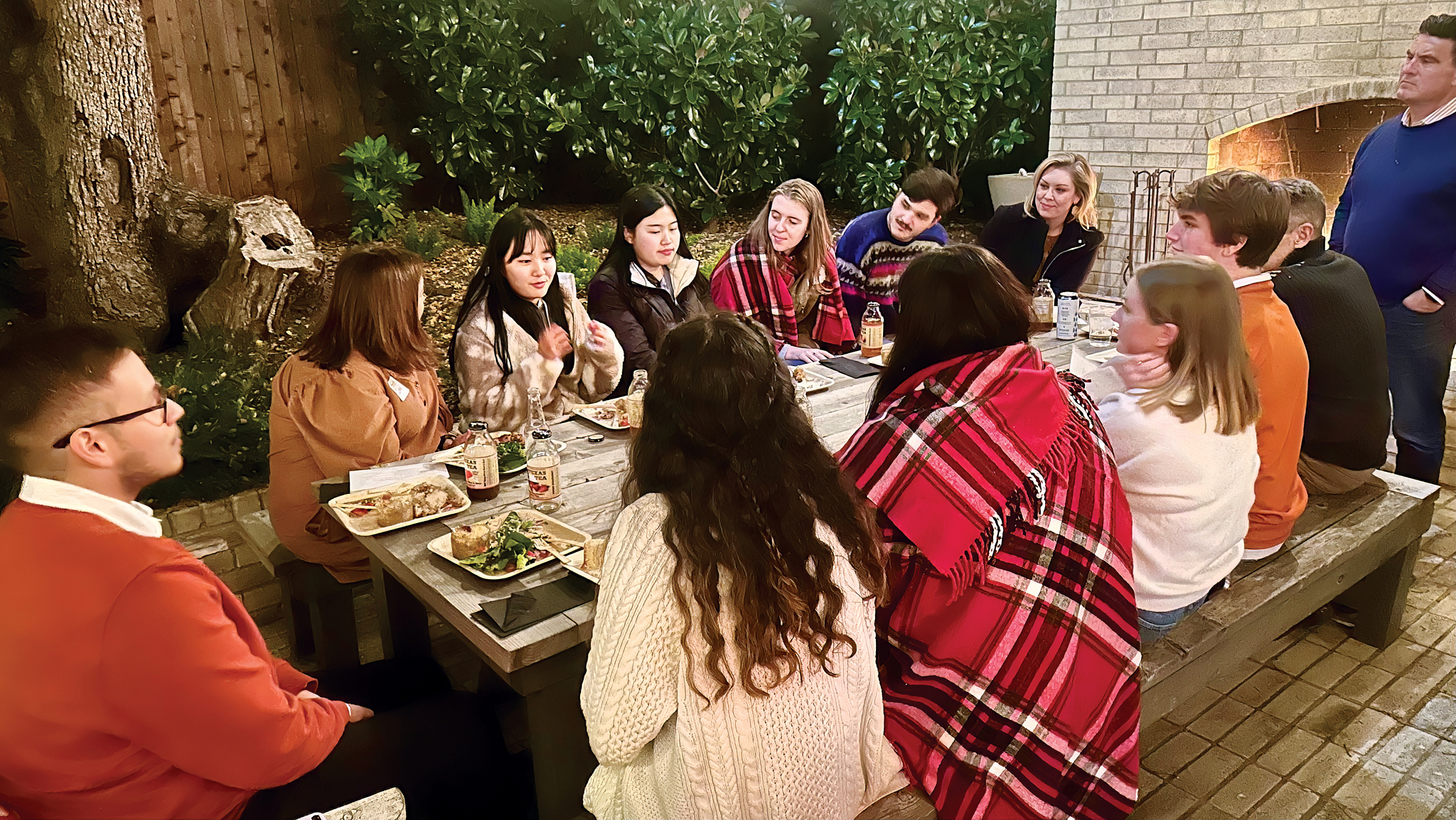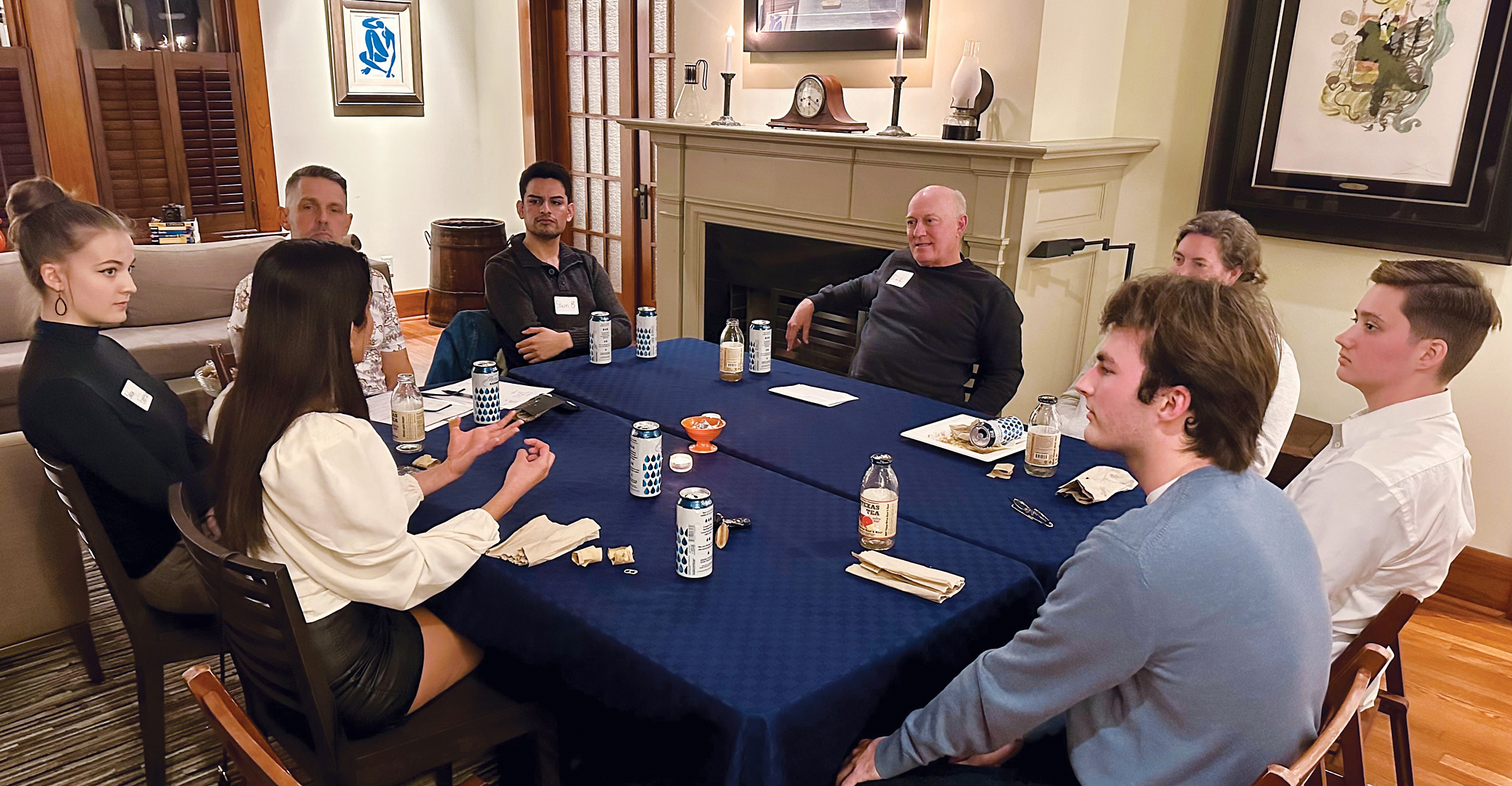This Program Brings Students and Alumni Together Over Dinner

At first, it seemed like a simple networking opportunity to Bobby Meza, a second-year sports management student. He’d show up for a free dinner with classmates, learn a post-grad secret or two from an alumnus, and be on his way. But after a hard semester at UT, which often left him puzzled and discouraged at the back of lecture halls, the Dinner with 16 Longhorns turned out to be so much more. Instead of stiff small talk, Meza ended up sharing his passions and struggles with the strangers across the table, and to his surprise, they had a lot in common.
“Having an opportunity to meet some people outside of your major, doing totally different stuff, you realize that we’re all just students. We all have the same imposter syndrome and we’re all just trying to get that degree,” Meza says. “It’s tough sometimes, but it’s not rare to feel this way, and the dinner really helped me see that.”
The Dinner with 16 Longhorns program began in 2017 as a joint project between the Division of Student Affairs and the University Ombuds, offering students an opportunity to share the experiences that shaped them. After its pilot semester, the program introduced alumni dinner hosts from the Longhorn Family Leadership Council, a parent group dedicated to supporting student life and mental health. This enabled students to not only connect with their peers, but seasoned professionals who could lend advice and expertise.

Although the program was halted during the pandemic, the dinners have since returned with increased frequency (eight are planned for this calendar year) and renewed purpose. According to Director of Development for the Division of Student Affairs Heather Miller, BJ ’95, students needed more opportunities to connect than ever after months of online classes in secluded dorm rooms.
“What it comes down to is people need people. During the pandemic, we saw a lot of people not able to interact one-on-one, and there was a loss,” Miller says. “We’re trying to help students just engage with one another again and have a sit-down opportunity in person.”
To participate in the program, students fill out a brief application. Then, 16 are selected at random to have dinner at an alumnus’ home. Although the students arrive as strangers, hosts and volunteers from the Division of Student Affairs break the ice using a series of questions inspired by The New York Times article “The 36 Questions that Lead to Love.” Surface-level introductions like, “Why did you pick The University of Texas?” get progressively deeper, prompting students to discuss more personal things—insecurities or fears about the future.
As a first-generation student, Meza says it made him feel less alone to talk about the challenges of transitioning to a large, prestigious university. He also found it reassuring when facilitators offered stories of their own struggles and successes.
“One of the ways that we lead and host is that we show our vulnerabilities, too,” says Tony Schell, BBA ’88, MBA ’95, who hosted the first off-campus dinner with his wife, Kristin, BA ’90, in 2018. “My wife and I talk about the challenges we faced as students, and then what we face in today’s life.”
As Longhorn Family Leadership Council co-chairs, the Schells were eager to host several dinners over the past few semesters. Schell says this is in part because he would have benefitted from a similar program in college. He transferred to UT as an upperclassman from a small town, which made it difficult for him to find his footing. Now, he hopes to inspire other students who are the first in their families to get a college degree.
“I had people that I reached out to as I was trying to forge my own way that were kind enough to help me, so I think it’s my time to pay it forward,” Schell says. “What I’ve learned from these dinners is that everyone, no exceptions, needs someone to talk to. These intergenerational relationships are really important in terms of passing the torch, whether it’s with a job environment, or just life and how to treat one another.”
Increasing these connections among the broader Longhorn community can be crucial for students experiencing periods of isolation, like fourth-year biology student Jonathan Anstead, who signed up for the July 2022 dinner while he was living alone in Austin over the summer.
“At the time, it was really just me hanging out in my apartment alone and not really doing anything,” Anstead says. “For me, the overall benefit was just having the opportunity to go to a place where there were other people.”
Through the dinner, Anstead met another student—an RTF major who had no common classes with him—and the two made additional plans to hang out again over the summer. It was an unlikely collision of worlds, and yet, they found good company in one another.
“Every college here has so many people that you could literally surround yourself with only people in your major and not even think that you’re missing out on anything,” Anstead says. “But, if you’re just surrounding yourself with people who think the same as you and have the same experiences as you, I don’t think it’s really conducive to growth on your part, and you might miss out on a great friendship.”
Miller says her office hopes to expand these summer dinners outside of Austin in the coming years to connect students who may similarly feel alone in their hometowns. Alumni are encouraged to reach out to vpsadevelopment@austin.utexas.edu if they are interested in hosting a dinner of their own.
CREDITS: Courtesy of the Division of Student Affairs





